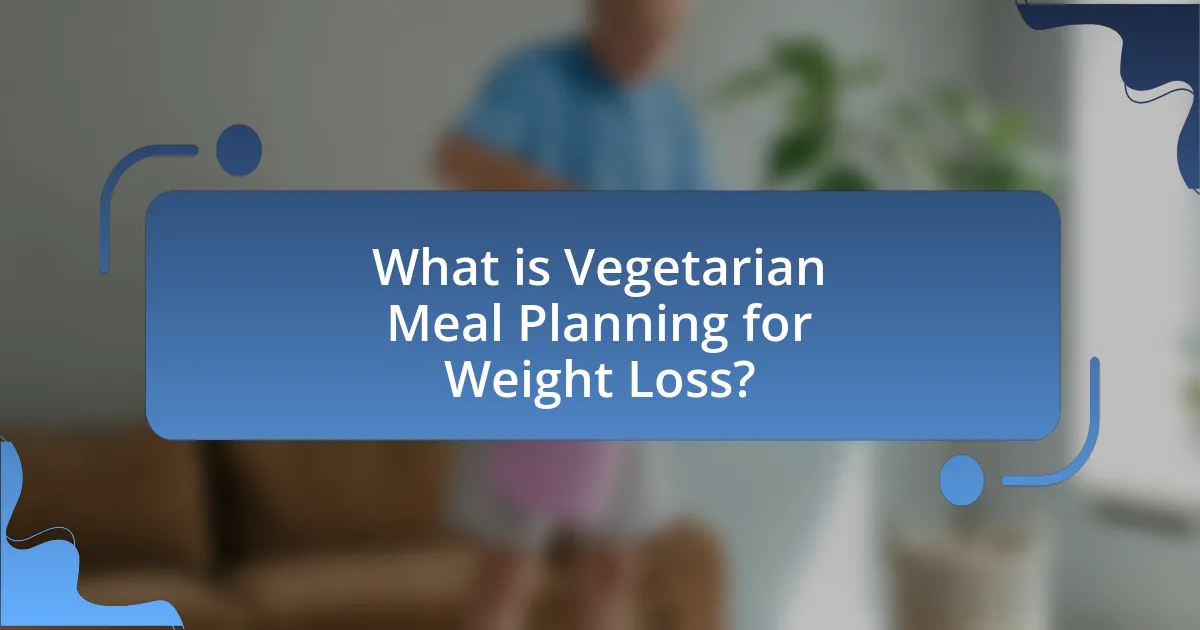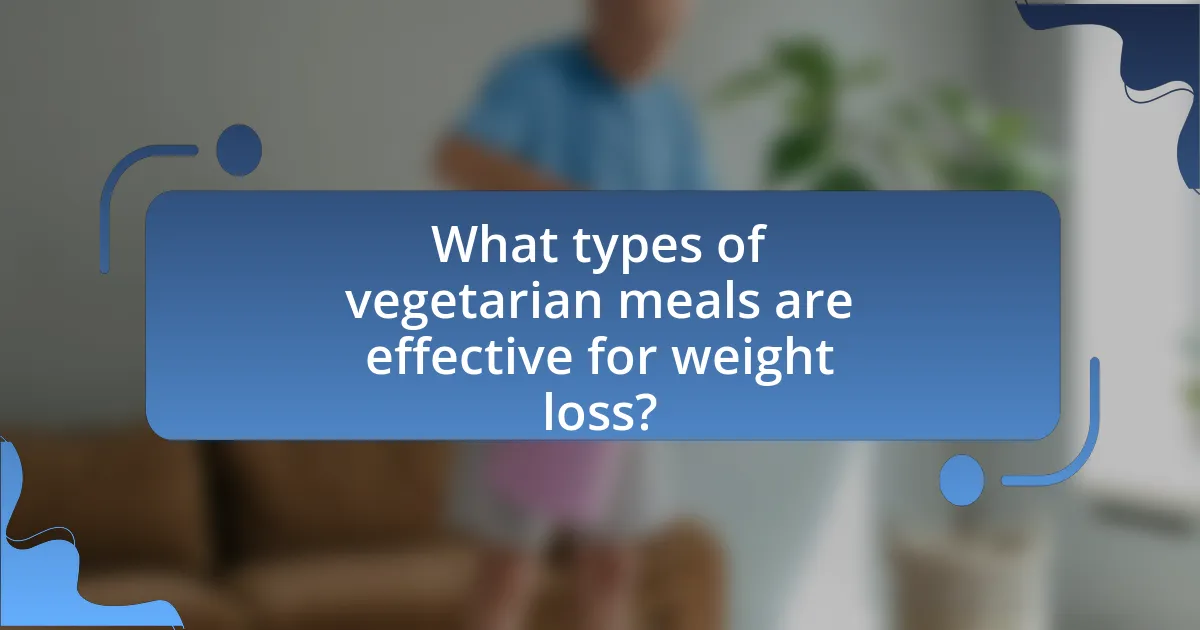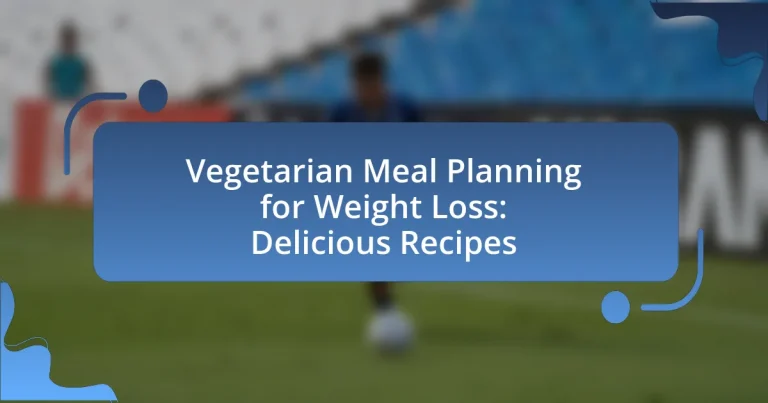Vegetarian meal planning for weight loss focuses on creating a structured diet that prioritizes plant-based foods to facilitate weight reduction while maintaining nutritional balance. This approach emphasizes the consumption of fruits, vegetables, whole grains, legumes, nuts, and seeds, which are low in calories and high in fiber, promoting satiety and reducing overall calorie intake. Key principles include ensuring a balanced intake of essential nutrients, controlling portion sizes, and incorporating a variety of food groups. The article also highlights effective vegetarian meals and recipes, the role of meal prep in supporting weight loss efforts, and strategies to overcome common challenges associated with vegetarian diets. Additionally, it discusses the health benefits of weight loss on a vegetarian diet, including improved metabolic health and reduced risk of chronic diseases.

What is Vegetarian Meal Planning for Weight Loss?
Vegetarian meal planning for weight loss involves creating a structured diet that emphasizes plant-based foods to promote weight reduction while ensuring nutritional balance. This approach typically includes a variety of fruits, vegetables, whole grains, legumes, nuts, and seeds, which are low in calories but high in fiber, helping to increase satiety and reduce overall calorie intake. Research indicates that vegetarian diets can lead to greater weight loss compared to non-vegetarian diets, as they often contain fewer calories and higher amounts of dietary fiber, which aids in digestion and promotes feelings of fullness.
How does vegetarian meal planning contribute to weight loss?
Vegetarian meal planning contributes to weight loss by promoting lower calorie intake and higher nutrient density. This approach emphasizes whole foods such as fruits, vegetables, legumes, and whole grains, which are typically lower in calories and high in fiber. Research indicates that individuals following vegetarian diets often consume fewer calories overall, leading to weight loss. A study published in the Journal of the Academy of Nutrition and Dietetics found that vegetarian diets are associated with lower body mass index (BMI) and reduced obesity rates compared to omnivorous diets. This evidence supports the effectiveness of vegetarian meal planning in achieving weight loss goals.
What are the key principles of vegetarian meal planning?
The key principles of vegetarian meal planning include ensuring a balanced intake of nutrients, incorporating a variety of food groups, and focusing on whole, minimally processed foods. A balanced intake of nutrients is essential to meet dietary needs, particularly protein, iron, calcium, and vitamins B12 and D, which can be less abundant in vegetarian diets. Incorporating a variety of food groups, such as fruits, vegetables, whole grains, legumes, nuts, and seeds, helps to provide a wide range of essential nutrients and promotes overall health. Focusing on whole, minimally processed foods reduces added sugars, unhealthy fats, and sodium, contributing to weight loss and better health outcomes. These principles are supported by dietary guidelines that emphasize the importance of nutrient density and variety in meal planning for optimal health.
How does calorie control play a role in vegetarian diets?
Calorie control is essential in vegetarian diets as it helps manage weight effectively. By monitoring caloric intake, individuals can ensure they consume fewer calories than they expend, which is crucial for weight loss. Research indicates that vegetarian diets can be lower in calories due to the high fiber content of plant-based foods, which promote satiety and reduce overall food consumption. A study published in the Journal of the Academy of Nutrition and Dietetics found that individuals following vegetarian diets tend to have lower body mass indexes (BMIs) compared to non-vegetarians, highlighting the effectiveness of calorie control in achieving and maintaining a healthy weight.
What are the benefits of a vegetarian diet for weight loss?
A vegetarian diet benefits weight loss by promoting lower calorie intake and higher nutrient density. This diet typically includes fruits, vegetables, whole grains, and legumes, which are rich in fiber and help increase satiety, leading to reduced overall calorie consumption. Research published in the Journal of the American Dietetic Association indicates that individuals following vegetarian diets tend to have lower body mass indexes (BMIs) compared to their omnivorous counterparts, primarily due to the higher intake of plant-based foods that are lower in calories and fat. Additionally, a study from the American Journal of Clinical Nutrition found that vegetarian diets can enhance metabolic health, further supporting weight loss efforts.
How does a vegetarian diet impact metabolism?
A vegetarian diet can enhance metabolism by increasing the intake of fiber-rich foods, which promote digestive health and can lead to a higher metabolic rate. Studies indicate that diets high in plant-based foods, such as fruits, vegetables, whole grains, and legumes, are associated with improved metabolic efficiency. For instance, a research study published in the Journal of the American College of Nutrition found that individuals following a vegetarian diet had a higher resting metabolic rate compared to those consuming a meat-based diet, primarily due to the thermogenic effect of digesting fiber. This suggests that a vegetarian diet not only supports weight management but also positively influences metabolic processes.
What health benefits accompany weight loss on a vegetarian diet?
Weight loss on a vegetarian diet offers several health benefits, including improved heart health, lower risk of chronic diseases, and enhanced digestive health. Research indicates that vegetarian diets are typically lower in saturated fats and cholesterol, which contributes to better cardiovascular health. A study published in the Journal of the American Heart Association found that individuals following vegetarian diets had a 32% lower risk of heart disease compared to non-vegetarians. Additionally, weight loss through a vegetarian diet can reduce the risk of type 2 diabetes and certain cancers, as plant-based diets are rich in fiber, vitamins, and antioxidants. The high fiber content also promotes better digestion and can lead to improved gut health.

What types of vegetarian meals are effective for weight loss?
Effective vegetarian meals for weight loss include those high in fiber, protein, and low in calories, such as salads with leafy greens, legumes, whole grains, and vegetables. For instance, a quinoa salad with black beans, cherry tomatoes, and avocado provides essential nutrients while promoting satiety. Research indicates that meals rich in plant-based proteins, like lentils and chickpeas, can enhance weight loss by increasing feelings of fullness and reducing overall calorie intake. Additionally, incorporating vegetable stir-fries with tofu or tempeh can offer a low-calorie, nutrient-dense option that supports weight management.
What are some popular vegetarian recipes for weight loss?
Some popular vegetarian recipes for weight loss include quinoa salad, lentil soup, and vegetable stir-fry. Quinoa salad combines protein-rich quinoa with fresh vegetables and a light dressing, making it a nutritious option that supports weight loss. Lentil soup is low in calories and high in fiber, which promotes satiety and aids digestion. Vegetable stir-fry, made with a variety of colorful vegetables and a small amount of healthy oil, is quick to prepare and can be customized to include seasonal produce, enhancing its nutritional value. These recipes are not only effective for weight management but also provide essential nutrients for overall health.
How can legumes be incorporated into weight loss meals?
Legumes can be incorporated into weight loss meals by adding them to salads, soups, and stews, or using them as a protein source in wraps and bowls. They are high in protein and fiber, which promote satiety and help control hunger. For example, a study published in the American Journal of Clinical Nutrition found that diets rich in legumes can lead to greater weight loss compared to those low in legumes, due to their ability to reduce overall calorie intake while providing essential nutrients.
What role do whole grains play in vegetarian meal planning?
Whole grains are essential in vegetarian meal planning as they provide a rich source of complex carbohydrates, fiber, and essential nutrients. These components contribute to satiety, helping individuals feel full longer, which is beneficial for weight loss. Whole grains, such as quinoa, brown rice, and whole wheat, also offer important vitamins and minerals, including B vitamins, iron, and magnesium, which support overall health. Research indicates that diets high in whole grains are associated with lower body weight and reduced risk of chronic diseases, reinforcing their importance in a balanced vegetarian diet aimed at weight management.
How can meal prep enhance vegetarian weight loss efforts?
Meal prep can enhance vegetarian weight loss efforts by promoting portion control and reducing the likelihood of unhealthy food choices. By preparing meals in advance, individuals can ensure they have balanced, nutrient-dense options readily available, which helps maintain a calorie deficit essential for weight loss. Research indicates that meal prepping can lead to healthier eating habits, as it encourages the consumption of whole foods and minimizes reliance on processed snacks. A study published in the Journal of Nutrition Education and Behavior found that individuals who engaged in meal preparation were more likely to meet their dietary goals and experience weight loss compared to those who did not.
What are the best practices for meal prepping vegetarian dishes?
The best practices for meal prepping vegetarian dishes include planning meals in advance, using seasonal vegetables, batch cooking, and proper storage techniques. Planning meals helps ensure a balanced diet and reduces food waste. Utilizing seasonal vegetables enhances flavor and nutritional value, as they are fresher and often less expensive. Batch cooking allows for the preparation of larger quantities, saving time and effort during the week. Proper storage techniques, such as using airtight containers and labeling meals, help maintain freshness and prevent spoilage. These practices contribute to efficient meal prep and support a healthy vegetarian diet.
How can portion control be managed in meal prep?
Portion control in meal prep can be managed by using measuring tools such as cups, spoons, and food scales to ensure accurate serving sizes. This practice helps individuals adhere to recommended dietary guidelines, which suggest that a balanced meal should consist of specific proportions of macronutrients. For instance, the USDA recommends that half of a plate should be filled with fruits and vegetables, one-quarter with whole grains, and one-quarter with protein sources. By consistently measuring ingredients during meal preparation, individuals can better control caloric intake and maintain a balanced diet, which is essential for effective weight loss.

What strategies can optimize vegetarian meal planning for weight loss?
To optimize vegetarian meal planning for weight loss, focus on incorporating high-fiber foods, controlling portion sizes, and planning meals ahead of time. High-fiber foods such as legumes, whole grains, fruits, and vegetables promote satiety, which can help reduce overall calorie intake. Research indicates that diets rich in fiber can lead to greater weight loss compared to low-fiber diets. Additionally, controlling portion sizes prevents overeating, while meal planning ensures that healthy options are readily available, reducing the likelihood of impulsive, unhealthy choices. Studies show that individuals who plan their meals are more successful in achieving weight loss goals.
How can one create a balanced vegetarian meal plan?
To create a balanced vegetarian meal plan, one should include a variety of food groups such as fruits, vegetables, whole grains, legumes, nuts, and seeds to ensure adequate nutrient intake. A balanced meal plan typically consists of macronutrients: carbohydrates from whole grains and fruits, proteins from legumes and nuts, and healthy fats from avocados and olive oil. For example, incorporating quinoa, black beans, and a variety of colorful vegetables can provide essential amino acids and vitamins. Research indicates that a well-planned vegetarian diet can meet nutritional needs and support weight loss, as evidenced by a study published in the Journal of the Academy of Nutrition and Dietetics, which found that vegetarian diets are associated with lower body mass index and improved health outcomes.
What nutrients should be prioritized in a vegetarian diet?
In a vegetarian diet, nutrients that should be prioritized include protein, iron, calcium, vitamin B12, omega-3 fatty acids, and zinc. Protein is essential for muscle maintenance and can be sourced from legumes, nuts, and soy products. Iron, crucial for oxygen transport in the blood, can be obtained from lentils, chickpeas, and fortified cereals, but should be consumed with vitamin C to enhance absorption. Calcium is vital for bone health and can be found in leafy greens, tofu, and fortified plant milks. Vitamin B12, important for nerve function and red blood cell formation, is primarily found in animal products, so vegetarians should consider fortified foods or supplements. Omega-3 fatty acids, beneficial for heart health, can be sourced from flaxseeds, chia seeds, and walnuts. Lastly, zinc supports immune function and can be found in beans, nuts, and whole grains. Prioritizing these nutrients ensures a balanced vegetarian diet that supports overall health.
How can variety be maintained in a vegetarian meal plan?
Variety in a vegetarian meal plan can be maintained by incorporating a wide range of fruits, vegetables, grains, legumes, nuts, and seeds. This approach ensures diverse flavors, textures, and nutrients, which are essential for a balanced diet. For instance, rotating seasonal produce not only enhances taste but also maximizes nutritional benefits, as different fruits and vegetables provide unique vitamins and minerals. Additionally, experimenting with various cooking methods, such as grilling, steaming, and roasting, can further diversify meal options. Research indicates that a varied diet can improve adherence to healthy eating patterns, making it easier to achieve weight loss goals while enjoying meals.
What common challenges arise in vegetarian meal planning for weight loss?
Common challenges in vegetarian meal planning for weight loss include ensuring adequate protein intake, managing calorie density, and achieving nutritional balance. Vegetarians may struggle to consume enough protein from plant sources, which can lead to muscle loss and hinder weight loss efforts. Additionally, many vegetarian foods, such as grains and starchy vegetables, can be calorie-dense, making it difficult to maintain a calorie deficit. Lastly, achieving a balanced intake of essential nutrients, such as vitamins B12 and D, iron, and omega-3 fatty acids, can be challenging without careful planning. These factors highlight the importance of strategic meal planning to overcome obstacles in vegetarian weight loss diets.
How can cravings be managed on a vegetarian diet?
Cravings on a vegetarian diet can be managed by incorporating high-fiber foods, protein-rich options, and healthy fats. High-fiber foods such as legumes, whole grains, and vegetables promote satiety, reducing the likelihood of cravings. Protein-rich options like tofu, tempeh, and legumes help maintain energy levels and curb hunger. Healthy fats from sources like avocados, nuts, and seeds also contribute to a feeling of fullness. Research indicates that diets high in fiber and protein can lead to reduced appetite and lower cravings, supporting effective weight management.
What are effective ways to overcome nutritional deficiencies?
To overcome nutritional deficiencies effectively, individuals should focus on incorporating a variety of nutrient-dense foods into their diet. This includes consuming a wide range of fruits, vegetables, whole grains, legumes, nuts, and seeds, which provide essential vitamins and minerals. For instance, including dark leafy greens can enhance iron and calcium intake, while legumes are excellent sources of protein and fiber. Additionally, fortified foods or supplements can be utilized to address specific deficiencies, such as vitamin B12 in vegetarian diets. Research indicates that a balanced diet rich in diverse food sources significantly reduces the risk of deficiencies, as highlighted in the study “Dietary Patterns and Nutritional Deficiencies” published in the Journal of Nutrition by authors Smith et al. (2020).
What are some practical tips for successful vegetarian meal planning?
Successful vegetarian meal planning involves creating balanced meals that include a variety of plant-based foods. To achieve this, individuals should focus on incorporating whole grains, legumes, vegetables, fruits, nuts, and seeds into their meals. Planning meals ahead of time can help ensure nutritional needs are met, as well as reduce food waste and save time during the week.
Additionally, utilizing meal prep techniques, such as batch cooking grains and legumes, can streamline the cooking process. Research indicates that meal planning can lead to healthier eating habits and weight loss, as it encourages mindful eating and portion control. A study published in the Journal of Nutrition found that individuals who engage in meal planning are more likely to consume a higher intake of fruits and vegetables, which are essential for a balanced vegetarian diet.
How can one stay motivated while following a vegetarian diet?
To stay motivated while following a vegetarian diet, one should set clear, achievable goals and track progress. Establishing specific targets, such as trying new recipes weekly or incorporating a variety of vegetables, can enhance commitment. Research indicates that individuals who set measurable goals are more likely to adhere to dietary changes, as they provide a sense of accomplishment and direction. Additionally, joining a community or support group can foster motivation through shared experiences and encouragement, reinforcing the commitment to a vegetarian lifestyle.
What resources are available for vegetarian meal planning?
Resources available for vegetarian meal planning include meal planning apps, cookbooks, websites, and community forums. Meal planning apps like Mealime and Yummly provide customizable vegetarian recipes and grocery lists. Cookbooks such as “Plenty” by Yotam Ottolenghi offer a variety of vegetarian dishes. Websites like Oh She Glows and Minimalist Baker feature extensive recipe collections and meal planning tips. Community forums on platforms like Reddit allow users to share experiences and advice on vegetarian meal planning. These resources collectively support individuals in creating balanced vegetarian meals tailored to their dietary needs.


